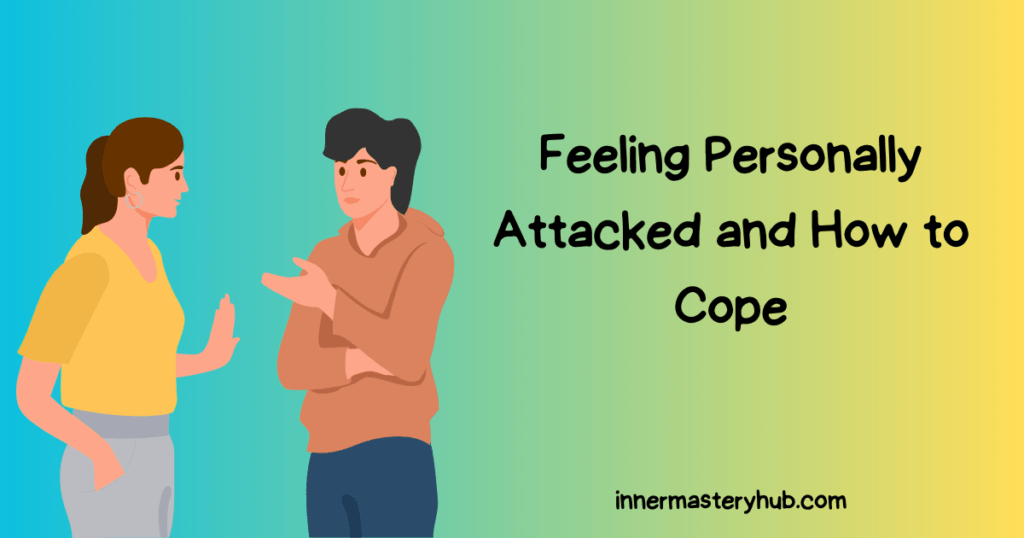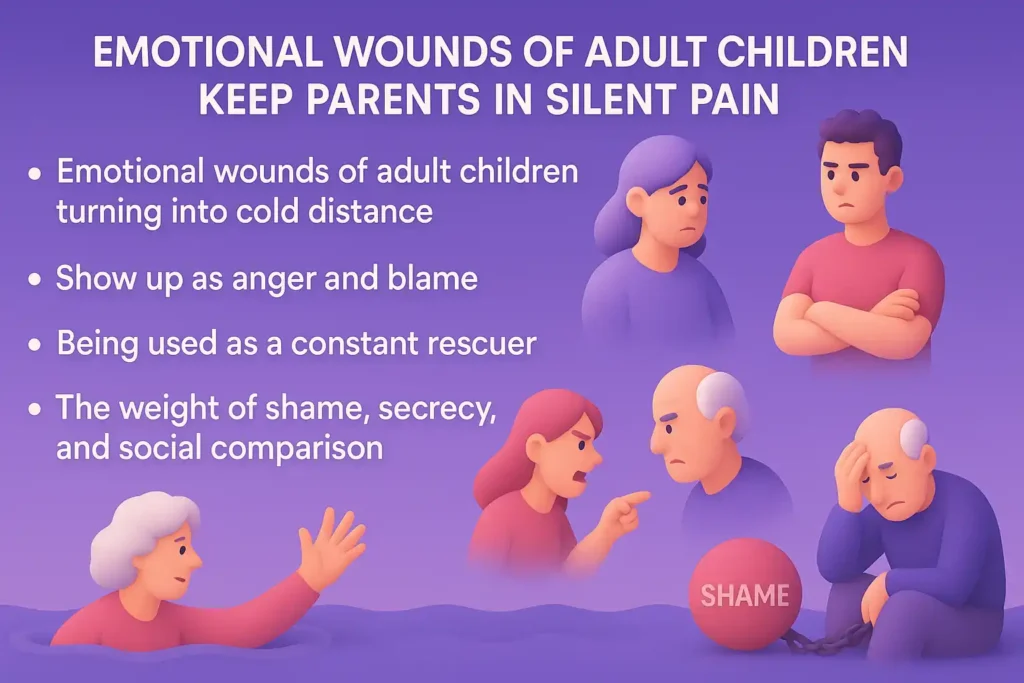Feeling Personally Attacked? 11 Ways to Start Feeling in Control

We are aware that personal attacks can take many different forms, ranging from character assassination and cyberbullying to harsh remarks and criticism. My objective is to give you the information and resources you need to react appropriately, safeguard your mental health, and, ultimately, come out stronger from these trying times, regardless of whether you being feeling personally attacked.
If you have been the victim of feeling personally attacked and would like to improve your readiness to deal with such circumstances, handling the situation with grace, maintaining your composure, and engaging in productive discourse is what you are about to learn.
Recognise being personally attacked.
Usually, the attacker focuses on you personally rather than on the subject or problem at hand. To minimise or cast doubt on your integrity, they frequently use disparaging remarks, insults, or baseless charges.
For example, someone may call you by the incorrect title or criticise you instead of having a fruitful conversation. Personal assaults frequently have little substance and are intended only to undermine you.
Personal attacks can take many different forms, ranging from in-person encounters to internet exchanges. They could appear as character assassination, rude remarks, or cyberbullying on the internet. Name-calling, hostile body language, and even direct physical threats may be used.
Distinguishing between a personal attack and legitimate criticism is essential. Personal assaults are intended only to cause pain or humiliation, whereas constructive criticism seeks to offer feedback and promote progress.
Knowing the language, tone, and context of the communication—as well as whether the other person is speaking directly to you or your point of contention—is crucial. Have faith in your feelings. Following a conversation, if you feel offended, irate, or ashamed, it may indicate that you have been personally assaulted.
How does feeling personally attacked show up?
You jump to defense instantly.
A small suggestion from a colleague or friend might feel like a full-blown criticism — and you retort or shut down. According to one article, when someone interprets everything as an attack, they’re often stuck in a loop of fear, misunderstanding, and negative expectations.
You feel shame or humiliation.
Even when no one meant to hurt you, you find yourself replaying the comment, feeling exposed or “less than”. One source says that shame can occur even if the attacker’s claims are unfounded.
You assume motives.
Instead of hearing someone’s words at face value, you ask: “What do they mean by that? Are they attacking me?” This makes you hyper-vigilant and exhausted.
Your self‐worth takes a hit.
When you’re always feeling attacked, you may believe: “I’m flawed,” “I’m inadequate,” or “People don’t value me.” According to research, people who feel personally attacked often have deep-seated insecurity or past negative experiences.
Relationships suffer.
Because you interpret remarks as threats, you withdraw, become defensive, or lash out. Others may feel walking on eggshells around you. Over time, friendliness fades and connection weakens.
You mistake feedback for betrayal.
Even genuine constructive comments might feel like an assault on your character. You might respond: “Oh, so you think I’m incompetent?” instead of “Okay, you want me to improve.”
You get stuck in a victim mindset.
You may believe: “They always pick on me,” “It’s never fair,” or “I’m the one who suffers.” And that mindset keeps you from taking control.
You avoid speaking up.
Because you’re scared of being attacked again, you might stay silent or shrink in groups — expressing less of yourself to stay safe.
You overreact later.
Something small might set you off hours later — you think: “Why did they say that?” You reply and it builds into anger or sadness.
Your physical stress goes up.
Feeling under attack keeps your body in a state of alertness. Some writing about feeling “under siege” says that when you believe you’re constantly threatened, your stress response stays on, and you get tired, anxious, and irritable.
You misread intentions.
You assume harmful intent even when someone’s being neutral or unclear — and that gap between what is said and what you hear drives conflict.
Understanding The Attacker’s Perspective
How to defend yourself if someone attacks you? There can be various
Envision yourself in the subsequent circumstance: Your general well-being, self-worth, or reputation is under attack. In such situations, emotions can be aroused, and seeking revenge may seem like the only way to protect oneself or regain control.
Put yourself in a position where you feel angry, irritated, ashamed, or afraid. Your judgment may be impaired by these intense feelings, leading you to act rashly without fully considering the consequences. You nearly feel as though you’re in the midst of an emotional storm and resort to self-defense by taking revenge.
Retaliation is frequently motivated by a sense of injustice. You might genuinely believe that the world needs to know about the wrong you’ve suffered. It’s as if you’re trying to get everything back in order and declaring, “I won’t stand for this.” Your retaliatory behavior is motivated by this desire for justice.
Being personally attacked can occasionally resurface old wounds. Being wounded or traumatized in the past might create emotional scars that increase your propensity to defend yourself when you sense a threat. It feels like old hurts are resurfacing, which makes you feel a greater need to protect yourself.
Misunderstandings may also be a cause. Imagine a circumstance where you misinterpret someone’s intentions or communications, and as a result, you respond defensively. It resembles a maze of misunderstandings and retaliatory behavior.
Think about the coping mechanisms you’ve acquired throughout time. Retaliation can develop into a default reaction or an emotional defense mechanism if you don’t have healthy strategies to handle unpleasant feelings or situations. It appears that you are using it to protect yourself from further injury.
The idea of moral justification is the conclusive one. Given the situation, you might think that your retaliatory actions are ethically justified. This belief may give your actions a sense of justification.
While awareness of these psychological processes does not justify retaliatory behavior, it does shed light on potential causes of such behavior. It highlights the complex interplay of emotions, opinions, and experiences that underlie retaliatory behavior. To break the loop and promote healthy interactions when navigating situations in which you get personally attacked, it is essential to develop empathy, effective communication, and conflict-resolution skills.

Best approach to deal with when feeling personally attacked
Let’s explore the psychological dynamics that can motivate someone’s “retaliatory” behavior.
No matter what triggers your reaction—hurt, guilt, devaluation, mistrust, disdain, rejection, outrage, insult, or whatever. This approach of self-defense will emotionally protect you almost immediately.
Ask yourself, “Before the other person pushed your button, which one of their buttons might you’ve pushed?” when you lose your cool. Your initial unease, anger, or negative sentiments about yourself will start to subside if you understand the other’s criticism or remarks as mainly expressing something about them.
You’re “taking in” what they said rather than “taking it out.” And this only makes things more complicated between the two of you. You can immediately do this to distance yourself from your internal suffering and turn your attention back externally.
You might start to develop new insights into the psychological dynamic that inspired that person’s “retaliatory” behavior by trying to understand where they might be coming from. And there are several inquiries you can put to them that, if phrased just correctly, can indicate the reason they were upset before turning against you.
By reframing yourself as an objective scientist instead of a reactive victim, you’re essentially teaching your brain to stick with the more mature, logical side of you and not let the current slight undermine your superior decision-making.
Keep in mind that the attacker’s words or deeds reveal their problems, fears, or feelings. It isn’t an accurate representation of your character or value. You can emotionally distance yourself from the attack by adopting this mindset change.
Recall that emotional intelligence and inner strength are demonstrated when you remain composed in the face of personal abuse. With time, effort, and self-awareness, this skill can be refined.
Believing that we are good, deserving people is a sign of emotional growth, not arrogance.
Importance of Retaining Composure When Being Personally Attacked
When responding to a personal attack, it’s essential to retain your composure because:
- Your response reveals a lot about your values.
- You won’t get any help from confronting your attacker.
- By doing this, the situation will not worsen.
- You’ll be able to manage your emotions more effectively.
- Your response will provide the attacker with insight into how to approach you.
What to Avoid When Being Personally Attacked
Impulsive or defensive responses can exacerbate the problem and reduce the likelihood of a constructive resolution. You may have a more rational and insightful discussion if you maintain composure.
Deep breathing exercises can help you feel less stressed right away. Please take a few deep breaths through your nose, hold them for a moment, and gently release them through your mouth. Repeat several times to maintain your composure.
We frequently have the instinct to attack back to defend ourselves when we feel personally attacked. However, usually speaking, fighting back only boosts how the attackers perceive us as individuals. If you act in a manner that is inconsistent with your values, it may also lead to feelings of guilt.
If possible, take a quick pause to refocus. A brief break from the situation can give you a fresh perspective.
How to Avoid Engaging in Destructive Behavior when Being Personally Attacked
Everyone is free to express their opinions. Whether you agree with them or not is entirely up to you.
Step 1: Pause & breathe
When you feel triggered, stop. Take a deep breath. Give yourself one moment before responding. That time helps you see if it is an attack or just a misunderstanding.
Step 2: Reality check
Ask yourself: “Did they really mean to hurt me, or am I reading this based on past hurt?” The article about feeling under siege suggests: separate what actually happened from what you think happened.
Step 3: Use “I” statements
Instead of “You always attack me!”, try: “When you said X, I felt like you were criticizing me.” It opens dialogue instead of blame.
Step 4: Build your self-worth
Work on your belief in yourself. The more confident you are in your value, the less likely you’ll feel small when others speak. The “don’t take it personally” guide suggests that low self-confidence and a fear of rejection often underlie these feelings.
Step 5: Ask for clarity
If you’re unsure, ask: “What did you mean by that comment?” Often, you’ll discover they didn’t intend what you heard.
Step 6: Set boundaries
If someone consistently makes you feel attacked, it’s okay to step away or say: “That remark hurt, please don’t speak to me like that.”
Step 7: Reflect on triggers
What past experiences make you extra sensitive? Acknowledging them gives you the power to change your reaction.
Step 8: Learn to respond, not react
One article on how to calmly respond to personal attacks advises: Recognize the shock or shame, detach a little from the immediate insult, and respond from your values—not your hurt.
Step 9: Practice empathy
Try to see the other person’s side. Perhaps they’re off, stressed, or not expressing themselves well. Putting yourself in their shoes can calm your reaction.
Step 10: Seek support
If you’re constantly feeling attacked, talking to a therapist or counselor can help you heal past hurt and learn healthier patterns.
Wrap-up
Feeling personally attacked isn’t just “in your head.” It’s real, and it shows up in how you react, how you feel, and how you behave. But it is something you can change. By pausing, clarifying, and building your inner strength, you can stop feeling like the target and start feeling stronger, calmer, and more connected.
FAQS about feeling personally attacked
How do you not feel personally attacked?
To avoid feeling personally attacked, practice emotional resilience. Separate criticism from your identity, focus on constructive feedback, and consider others’ perspectives. Cultivate self-confidence and self-awareness, reminding yourself that criticism doesn’t define your worth. Lastly, seek support from friends or professionals to build emotional strength.
What does feeling personally attacked mean?
A personal attack, often referred to as ad hominem, is a fallacious argument tactic in which someone criticizes or insults their opponent’s character or attributes rather than addressing the actual argument or issue at hand. It involves attacking a person’s character, motives, or background, rather than engaging in rational discourse.
What do you do when you feel personally attacked?
When you feel personally attacked, take a moment to breathe and remain calm. Assess if the criticism is valid or emotional. If it’s reasonable, consider it constructive feedback. If it’s moving or baseless, choose not to engage, set boundaries, and communicate assertively. Seek support from friends or professionals if needed.
Why do people make personal attacks?
People may make personal attacks for various reasons, such as insecurity, frustration, or a desire to divert attention from their shortcomings. Personal attacks can also be used as a manipulation tactic to gain power or control in a disagreement. It’s essential to address such behavior constructively and maintain respectful communication.
How do you act when someone attacks you personally?
When someone attacks you, remain composed and refrain from retaliating with aggression. Listen actively to understand their perspective, and express your own calmly. Set boundaries and assertively communicate that personal attacks are unacceptable. If necessary, disengage from the situation or seek assistance from a mediator or authority figure to resolve the issue.
Are we expected to abide by thinly veiled insults?
No, you are not expected to tolerate thinly veiled insults. It’s essential to assertively address such behavior by communicating discomfort and setting clear boundaries. Encourage respectful and open communication to maintain healthy relationships while not accepting or condoning insulting or disrespectful remarks.
Why do I always feel personally attacked even when someone says something small?
It could be that you’re sensitive to judgment, have past hurt or insecurity, and your mind reads neutral comments as threats. This makes you interpret even mild remarks as attacks.
Is it normal to feel personally attacked?
Yes—many people experience it. Feeling this way often comes from past experiences or fear of criticism. The key is how often it happens and how strongly you react.
What triggers the feeling of being personally attacked?
Triggers include: past bullying or criticism, low self-esteem, feeling unnoticed or unsafe, or having high expectations of how others should treat you. These make even small remarks seem big.
What happens if I continue to feel personally attacked all the time?
You may withdraw from people, become defensive, struggle to trust feedback, have higher stress, and relationships may suffer. It can become tiring and may prevent you from fully understanding what others really mean.
How can I stop feeling personally attacked so easily?
Pause before reacting, ask, “What did they really mean?” Work on your self-worth, build awareness of your triggers, and practice seeing the comment neutrally, not as hostile.
How can I tell if I’m overreacting or being fairly attacked?
Check: Did the person intend to target you? Is the comment factual criticism or vague hurt? Did you assume intent without asking? Then you might be reacting to your interpretation more than the fact.
Why do I feel personally attacked at work?
You may interpret feedback, tone, or body language as personal because you feel vulnerable about your performance or value. This triggers defensive feelings and makes you feel like a target — even if the comment wasn’t meant that way.
How do I calm down when I feel personally attacked?
Pause and breathe. Ask yourself: “Did they mean to hurt me?” Slow your reaction. Then respond from your values — not pure emotion. This helps you stay grounded and avoid making the situation worse.
Is it always bad to feel personally attacked?
Not always. Sometimes, the feeling can signal that you need to establish or protect your boundaries or address unfair treatment. However, if you consistently feel this way without a clear cause, it’s worth exploring. However, if you consistently feel this way
Can I change how often I feel personally attacked?
Yes. With awareness, you can: identify your triggers, practice self-worth, respond calmly, check assumptions, and ask for clarity. Over time, you’ll react less, feel safer, and understand situations better.
Can religious or cultural backgrounds affect feelings of being personally attacked?
Yes. If you come from an environment where criticism was harsh or where honor and face are significant, you may be more sensitive to remarks and interpret them as attacks more quickly.






